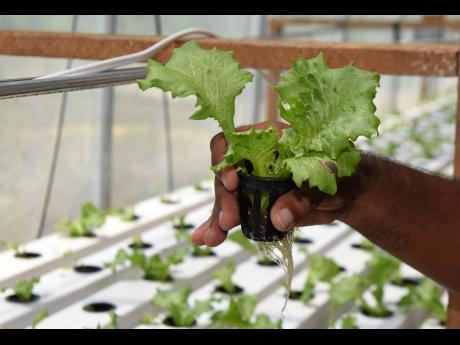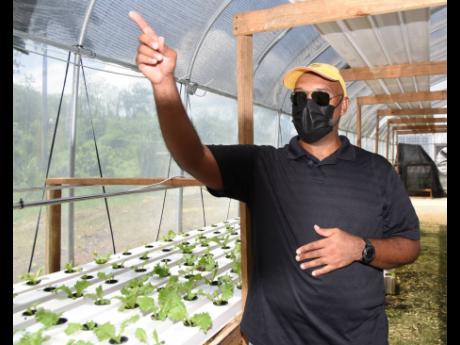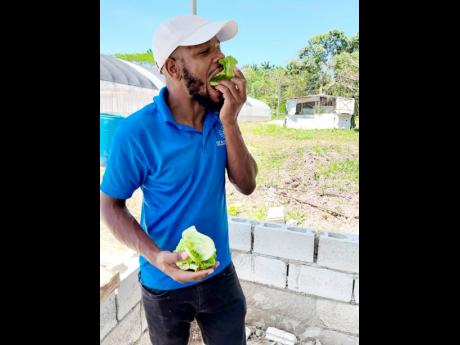Son of the soil? Who needs soil?
Lettuce farmers rave about virtues of hydroponics
An electrical engineer by profession, Bryan Francis has ventured into hydroponic farming, a method of growing crops without soil.
Without a steady water supply or adequate rainfall, hydroponics is a sustainable means of growing produce, even in small spaces.
Still in its infancy, Bella’s Farm in Bog Walk, St Catherine, produces Trinity Star lettuce through a heavily automated process, requiring limited human input. The farm, run by three partners, is owned by BDF Automation Ja Ltd.
Francis desired to invest creatively in Jamaica, pumping $30 million into the operations thus far, and is procuring additional equipment to further increase productivity.
“It’s very expensive to start the smart way, but it is very lucrative,” Francis remarked.
During a tour, farm manager Lorne Green told The Gleaner that construction began in January, and the first test batch was sown in February.
“We have a capacity of just over 9,000 head, but because we are still in testing, we are only doing just about half of that.
“These lettuce are more leafy, and given the fact that the temperature is warming up, the lettuce is not folding so much. We are getting just over 4,000 head of lettuce,” he said.
Green said there are plans to sow sweet peppers and strawberries once they are satisfied that the lettuce is at optimum quality.
“With the operation we have going here, we use pretty much 10 per cent of what the average farmer would use out in the field. For communities with water-supply issues, setting up a greenhouse like this with hydroponics would eliminate that problem,” Green said.
From a control room, temperature, water flow, and water levels are monitored.
Owing to the fact that the greenhouse and its monitoring systems depend heavily on electricity, there is a backup power supply.
Francis theorised that the best way to achieve consistency was through automation.
“Part of the reason prices for produce in Jamaica are high is because of the labour cost. If you normally get 10 people on the farm, you will need one or none at all once it’s automated,” the 35-year-old said.
Francis said that a controlled environment is key to increasing agricultural yields for local consumption and export.
“There’s no bad weather or water shortage to affect your yields. If the pH is off, it corrects it on its own. If it needs more chemicals, it pumps it in. Once that consistency is there, you can market that product, and it is very lucrative. It can be nicely packaged and be sold at a premium rate,” Francis explained.
He found support in Rural Agricultural Development Authority (RADA) CEO Peter Thompson, who said that hydroponic systems were favourable for the growing of cucumbers, tomatoes, and leafy vegetables.
“Most of these systems are under cover, so they don’t use much pesticide as when crops are grown in an open field. Because you’re pumping nutrients in the water, you see better results than when they are in the open,” Thompson said.
Though he could not give an estimate of the number of farmers utilising hydroponics, successful farms are located in Hanover, St Mary, and Manchester.
Thompson highlighted that hydroponics is one of the technologies being pushed by RADA and the agriculture ministry.
He said it tends to attract younger people coming out of institutions like Knockalva Polytechnic College and the College of Agriculture, Science and Education, as conventional farmers are hell bent on traditional methods of cultivation.
Meanwhile, Francis’ harvest has been sold in the market and donated to community people, but there are plans to supply a supermarket with samples in a few weeks.
He has received technical support from RADA and intends to enter into business agreements with community folk who have available lands.
The end goal is to own a green grocer with a variety of produce available for sale through online shopping.
He does not have much interest in export yet as he desires to assist with ramping up local production as a means of reducing Jamaica’s import bill.
Francis is working on receiving Good Agricultural Practices certification from the United States Department of Agriculture.
The voluntary audit verifies that fruits and vegetables are produced, packed, handled, and stored to minimise risks of microbial food-safety hazards.



